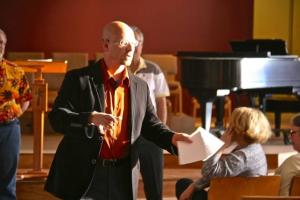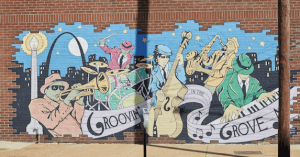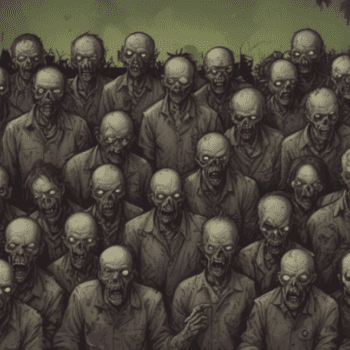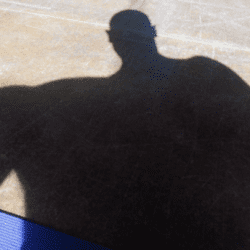 It may seem like progressive Christianity doesn’t adequately address the reality of sin – or even that it rejects the notion all together. That isn’t accurate. Progressive Christians do tend to understand sin differently than our conservative Christian friends, but that doesn’t mean we reject or deny sin. I wrote about this matter once before on this blog, posting most of the Chapter on Sin in my book Kissing Fish: Christianity for People Who Don’t Like Christianity.
It may seem like progressive Christianity doesn’t adequately address the reality of sin – or even that it rejects the notion all together. That isn’t accurate. Progressive Christians do tend to understand sin differently than our conservative Christian friends, but that doesn’t mean we reject or deny sin. I wrote about this matter once before on this blog, posting most of the Chapter on Sin in my book Kissing Fish: Christianity for People Who Don’t Like Christianity.
Today, I’m posting the transcript of a sermon that I preached at The Fountains Church in Fountain Hills, AZ on March 30, 2014. You can hear me deliver this message – complete with live jazz musicians accompanying at the end of it! – by clicking here.
Here’s the transcript of that message:
You’re listening to a message delivered at the Fountains a United Methodist Church in Fountain Hills, AZ.
Rev. Dave Felten: Again, I’m so thrilled to have Roger with us this morning. We were talking about things yesterday, and Roger said, “So how far do you want me to go?” He said. “Do you want me to go even further than you normally go – so they’ll think “well we’re even more glad to have David as our pastor!” and I said “You just let them have it, they can take it.” So I’m really thrilled to have a a fellow spirit here in in trying to do what we can to re energize what Christianity looks like in the 21st century. I’m totally thrilled to have Roger here, and Barb is going to read a couple of his Scripture passages for today, which you’ll find up on the screen. And then, without any further ado, we’ll have Roger bring us a message this morning.
Liturgist: The words of wisdom come to us from Matthew 5:40-48 ..and if anyone wants to sue you and take your shirt, hand over your coat as well. If anyone forces you to go one mile, go with them two miles. Give to the one who asks you, and do not turn away from the one who wants to borrow from you. You have heard that it was said, Love your neighbor and hate your enemy. But I tell you, love your enemies and pray for those who persecute you, that you may be children of your Father in heaven. He causes his Son to rise on the evil and the good, and sends rain on the righteous and the unrighteous. If you love those who love you, what reward will you get? Are not even the tax collectors doing that? And if you greet only your own people, what are you doing more than others? Do not even pagans do that? Be perfect, Therefore, as your Father is perfect.
Our second reading comes from the letter to the Romans 7:15-20. I do not understand what I do. For what I want to do I do not do. But what I hate, I do. And if I do what I do not want to do, I agree that the law is good as it is. It is no longer I myself who do it, but it isn’t. It is sin living in me. For I know that good itself does not dwell in me, That is in my sinful nature. For I have the desire to do what is good, but I cannot carry it out. For I do not do the good I want to do, but the evil I do not want to do. This I keep on doing. Now if I do what I do not want to do, it is no longer I who do it, but it is sin living in me that does it. Hear what the Spirit is saying to the Church.
 Rev. Roger Wolsey: It is SO good to be back in Arizona! I was here for a full year in 1971 when I was 3, and if you were here back then and you were reading the newspapers at all, you might have heard of my father. He was a chemistry professor and he was down here doing a sabbatical year at ASU. One day he was working in a chemistry lab, the kind with a hood, working behind the the plexiglass with the gloves, you know, inside the box. And he was working with something called perchlorates. And because of his work with them, they learned that they’re very volatile! The experiment blew up and he lost a finger. He has since become a national expert on lab safety in the laboratories of America. You may have heard of that. I don’t know. It’s a small thing, but it sure affected our family. And part of my family is still literally here in this state! laughter..
Rev. Roger Wolsey: It is SO good to be back in Arizona! I was here for a full year in 1971 when I was 3, and if you were here back then and you were reading the newspapers at all, you might have heard of my father. He was a chemistry professor and he was down here doing a sabbatical year at ASU. One day he was working in a chemistry lab, the kind with a hood, working behind the the plexiglass with the gloves, you know, inside the box. And he was working with something called perchlorates. And because of his work with them, they learned that they’re very volatile! The experiment blew up and he lost a finger. He has since become a national expert on lab safety in the laboratories of America. You may have heard of that. I don’t know. It’s a small thing, but it sure affected our family. And part of my family is still literally here in this state! laughter..
When I think about those years, my mom told me that we attended a United Methodist Church just South of Tempe. And she remembers that communion was different there. She’s from Virginia originally and they’re a little bit more high church. You can imagine in the sacrament of communion their Methodism, and well communion at this United Methodist Church South of Tempe – was different! They used tortillas and tomato juice which is very regionally appropriate and it certainly helps a progressive mindset that it gets us off the literalness of this stuff. And it’s more about the common intent that we have when we commune together and realizing that we are the living body of Christ. And this congregation, as I understand it, has a maybe you don’t use tortillas and tomato juice, but you have a similar kind of progressive understanding of what the sacrament of communion is all about. You, you get it. You you live it. You do communion – you commune!
Now I’m going to begin this time by playing a song. The song dates me a bit in terms of my musical lineage and history. This song came out around 1982, and it may ring a bell – “Atomic Dog.”
excerpt of the lyrics: Bow-wow-wow-yippie-yo-yippie-yay! Bow-wow-yippie-yo-yippie-yay! … Why must I feel like that? Why must I chase the cat? Just the dog in me Nothin’ but the dog in me…
All right, so that song came out in 1982 by George Clinton. This is sort of the early predecessors of a hip hop movement, The Sugar Hill gang, Grandmaster Flash and The Furious Five. I’m a white kid from Minnesota. Why do I know this stuff? Well I do. And that song, Atomic Dog with its – Why must I Chase the Cat? – I think captures for a generation, a bit about part of the human condition.
Now maybe that song had in mind men and their tendency to go after girls in not so wonderful ways, but that itself can be a metaphor for a part of the human condition that a lot of times progressive Christians don’t think about too much. Or we think maybe we don’t need to think too much about the concept of sin. I want to suggest that it may seem like progressive Christianity doesn’t talk about sin very much. Your pastor, David Felton, co-authored a book called Living the Questions. Some of you have probably read it or seen it. A 271 page book according to the index. There are 10 pages of these 271 pages that deal with sin. It’s a rather small number, right? I wrote a book, Kissing Fish, a 379 page book, 15 pages dealing with sin. An even smaller percentage.
So if you take these two books as introductions to Progressive Christianity as representative of the of the progressive approach to the faith, you might deduce that Progressive Christianity doesn’t really focus on sin very much. It doesn’t really have that as a forefront, a Forte, a concern, an agenda. And there might be some truth to that. And it could be a good thing because in some respects it’s in reaction to perhaps an over-emphasis on sin by certain other sectors of the Church that overplayed that hand and so many folks are off put by it and rejecting that whole concept. Yeah? So sometimes we can have the notion that maybe we are “post” sin. We’ve somehow evolved past all of that. You know, it’s sin that’s an archaic thing. That’s what the, you know, that’s what we did back then. But we don’t deal with sin. Sin? Nah, that’s not what we do. We’re we’re just fine right the way we are. Well, I want to suggest, maybe not quite.
In fact, in the past month, as I was watching the news of what’s going on down in your state, I had half a mind to boycott my own visit down here! Do I want to spend my money in a state that has a state legislature that passes a bill decisively that would allow the state to legally discriminate businesses, to legally discriminate against gays and lesbians? Sort of Jim Crow 2.0. Really? In 2014? We’re going to do that?! Now your governor did veto that bill. But did she do it out of theological mindset of race and love and was it more the NFL is considering not have the Super Bowl here because of that bill? Bottom line: I think maybe more that was what swayed things. And then within a week or so after that fiasco, there was this white power rally in Phoenix. Now, not it wasn’t a huge turn out, but it happened and it made the national news. A white power rally, a KKK white what? In 2014? What? What is this?
And then you’ve got this “certain sheriff…” And I don’t even need to finish that thought. You all already know what I’m talking about! He’s got a history of assuming the worst about people of darker skin complexion and his speeches work to get others to assume that brown people are undocumented and then encourages folks to go after them with that assumption, you know, “guilty until proven innocent” regarding their legal status.
But what caught my eye most recently was in January. He put American flags in the cells, and if any of the inmates defaced or what weren’t patriotic toward those flags, and he deduced that they were unpatriotic. Apparently he’s got them eating bread and water in response. Well, I don’t know if you know about that. You know humans can’t function and thrive very much with that lack of nutrition, just bread and water. But that’s not the biggest part of this. This has been an age-old form of torture.
If you feed someone bread and water only they it causes severe constipation which causes internal suffering. Who is he to be? Judge, jury and constipationer?! I mean this doesn’t make any darn sense. What? We’ve got this Constitution and what’s becoming of this state? I don’t know. OK. So moving beyond Arizona, though, it is the case when we think about sin – Conservative Christianity and Progressive Christianity have approached it differently and focus on different parts of it, except that maybe in some respects it is a common part. Conservative Christianity, you would think sin has to do with the pelvis – sex, abortion – things that pertain to the pelvis seem to be their focus and whole focus of sin. And Progressive Christians – at first I was going to say not something to do with the pelvis, but then I realized actually it does. It’s our wallets, it’s money, our checkbooks, our pocketbooks as a moral document, how we spend our money, where we spend it. We’re concerned about social sins, generally speaking, more than the personal private ones that happened in bedrooms. Generally speaking, this is a stereotype. But let’s go with that, the wealthiest 67 people on this planet have more wealth than the poorest 3.5 billion people on this planet. Now, if any of those 67 identify as Christian, I wonder about their commitments. And yes, it’s possible that these people got their wealth because they worked hard for it. They pulled themselves up by their bootstraps and they earned their way and they deserve what they’ve gotten in life. Some of that could be true, but I suggest that maybe there’s also some truths, that maybe there was some doing it on the backs of others. Something to think about..
Another matter concerning Arizona. The Phoenix area is the second largest hub of human trafficking in this country, there are more people enslaved on this planet in 2014 than at any time in human history. More than during the height of the U.S. slave trade. More people enslaved at this time. And it’s on our watch. The news doesn’t cover it every day. It’s not on our minds necessarily, but it’s on our watch. It’s happening in our midst. And when we just think about how we treat our planet, are we being good stewards of the earth that God has entrusted to us that we’re hoping to pass on to future generations and future generations? There’s a good case to be made that maybe not so much it’s impossible.
I’m going to suggest that it’s impossible for us to look at a newspaper or even look in a mirror and not see some degree of sin going on in the world and in our lives. In Matthew 5, Jesus said for us to love our enemies and to pray for our enemies and those who persecute us. And do we love our enemies? Do we pray for them? When was the last time he prayed for one of your enemies? Anybody. Really? Are we perfect as our Father God is perfect as Jesus is inviting us? Let me put it this way, If you think you’re “post”-sin, if you think you don’t have sin in your life, I’m going to invite you to ask that question of the people you live with. Do they think you’re post sin? Just a reality check. You might learn something. Bottom line is, I think that there there may be places in our lives, Not that God is judging us and going to send us to hell, but where maybe metaphorically, Jesus is doing a face palm when he’s “Oh dear, Roger just went there?!? Sigh.”
He just said that there could be these sort of notions. Now I don’t think that to go along with this line of thinking that we need to buy into the notion of original sin. Original sin sounds authentic in part of the Christian tradition. “Original sin,” that sounds like a central tenet of the faith yeah? “Original.” Well, the first Christians, the 1st 300+ years of the faith, never even heard of that phrase. It wasn’t until Augustine came along and did his reading of Paul and other folks and realizing that his own Playboy life earlier in life when he was younger was wayward and he had some issues. And then he created this notion of original sin and sex being that pelvis thing that kind of led to the rest of it. But I don’t think it’s right or accurate for us to look at ourselves as saying we were born in original sin or that that’s what defines us as Christians or as as central to our faith.
I rather like Matthew Fox and his notion of original blessing. And when you look at the scriptures, God created us and said it is good and it is good. And I think that it’s unfair to say that we’re more wretched than blessed. I think when we think about our lives, there’s a whole lot more blessing than wretchedness. But we do fall short and we do screw up. And why do we chase the cat? Why are we like that? Well, it’s a dog in US. There’s some sin in US. Well, what is sin? Sin is disconnection from God. And I want to suggest, maybe it’s also disconnection, therefore, of who we really are, who we really are. It’s disconnection from reality. It also relates to a notion my my theology is informed by something called process theology. And in process theology. God is is powerful, but not in a forceful way, in a persuasive way. And God, moment to moment looks at the world and what’s going on in it and subtly woos and nudges.
Ah, this would be a beautiful way to for these. Yeah, try to woo and nudge and to the extent that our radars are tuned we can feel a wooing or a nudging and we can respond. I don’t know if you’ve experienced this before, but let me give you an example. Yesterday I I had a great day. Your pastor took me out for breakfast where I experienced a waffle dog and put it in the syrup with the Cholula sauce and Oh! it was a great breakfast experience and he dropped me off at the Marriot Hotel. A few hours went by, and after I digested all that, I decided to go for a run. And I’m disoriented. This is not my city. I can’t predict where the mountains are like I can in Boulder and I wanted to go for a run. So I look around like, which which way do I want to go? So I just, I’m from Minnesota. So I started going north because I like north. And so I’m heading north up 44th, and then all of a sudden I see a street sign it says Weldon – Weldon.
That reminds me of one of the little towns that I served as a pastor a few years ago in Iowa, where I served a four point charge, four churches simultaneously in Decatur County, the poorest county in the state of Iowa down by the Missouri border. And then I kept running and I saw Clarendon. Clarendon, that’s a town nearby Weldon, another teeny little town in Iowa. And then keep going. There’s Indianola. Like, oh, Whoever named these streets must have been from Decatur County or knows about that because how could these three streets in a row not be from that county, from that connection? And so I’m thinking about how I enjoy serving as a United Methodist pastor in that community. And I’m running and I go further and further and I’m at a lower altitude, So I’m going further than I normally would because it feels easier. And I get myself past where we had breakfast inadvertently. And then I get up on Arcadia and I head towards the Camelback. And I’m at a certain sense, I’m like, oh, maybe maybe your lungs are good, but maybe your legs are going to hurt like heck tomorrow if you keep going. So maybe it’s time to turn around and figure out how far you’ve gone. And I saw another runner, and I said, hey, can you tell me how far I am from the Marriott on 44th? And he said, you’re about 5 miles.”
Wait. 5 miles?!? I’m going to run 5 miles back, like I’m doing 10 miles today? Man, what have I done? And so we’re running together in the same direction. And as we’re running, I learned that he was raised as a United Methodist. And I learned that Bradley isn’t currently going to a United Methodist Church. And he learned that I’m speaking here today and he learned that I’m speaking at Crossroads tonight and sort of why not share that with him. And then as we continued running before we parted ways, he said, “You know, it really is better running together.” And I offered him a gift. I said, “Yeah, it really is. And and you might want to think about that in the fuller part of your life. Just think about that. Run with that!” Now, that whole chain of events, just me and my own creativity and my own inclinations? Or possibly was there some little wooing in my being open to the wooing and the nudging. Maybe I’m going to suggest maybe. And maybe you’ve experienced that sort of thing in your own life.
So you know what I’m talking about. Now. To the extent that we can respond In sync with that wooing, arguably we’re in sync with God’s will to the extent that we miss the mark. One of the old definitions of of sin is actually missing an archer’s, missing the target, missing the mark. And spring training is going on in your state right now. And maybe a modern day version for a lot of us is, is baseball. And to the extent that a batter has his eye on the ball and hits that ball, OK, bam, right on. To the extent that he or she misses, arguably that’s metaphorically like sin. Or in golf. If you’re teaching yourself golf, you can really learn some bad habits. It take a long time to unlearn, and maybe if you do something often enough, you end up slicing all the time, right? OK, so sin is a little bit like neuro-pathways that are in our brains.
Let me speak first as a Minnesotan, I think about frostbite more than you all probably do. And so from Minnesota, if you’re outside with unexposed, exposed skin for too long, there’s a wind chill factor, and you have to know what that factor is. And your your tip of your nose, your fingertips, your toe tips are vulnerable extremities. And if they’ve gotten frostbite like the tips of my ears have, they’re more prone to getting it again. Which makes it more prone to getting it again. It’s a little bit like eating a Pringles. It’s hard to stop. Just eat one Pringles. You’re pretty much eating the whole can, next thing you know right? Well. So when you do something, it creates A neuro-pathway. Like I now have touched this, which I’ve never done before. I am more inclined to do that again and have it easier now. I don’t even need to look at it. I just know where it is, right? A neuropath way has just formed, and the more we do something, it creates a neuro-super-highway. And sin in a way can be like that. It can be an ingrained way. Or following Jesus can be an ingrained way, yeah?
OK, With that in mind, some people think of sin as ultimately it’s ignorance, but there really isn’t sin per se, It’s ignorance. Because if someone really, really, truly knew the consequences of the suffering that might happen, if they do something, they wouldn’t do it, and therefore it’s about educating people, HG Wells said, Human history has become more and more a race between education and catastrophe. So maybe we can educate people. And I think there are some kinds of things where that may be the case. Now it the mud slides in Washington state, Horrible, right? 97 people, I don’t know, a lot of folks gone. It’s horrible. Some leading theories about what may have contributed to this is illegal, clear-cutting, logging just beyond that area. And it was even known that this sort of thing might happen in some people’s minds.
If, this is in fact part of what happened, the people who are doing that clear cutting, that logging surely surely wouldn’t have been doing what they were doing if they knew what might happen, what it could possibly have led to, Surely that would be a great example of just ignorance, right? Surely. But some people might say that, you know, it sometimes seems that humans may know full well what could happen and yet do it anyway. Sometimes we know full well what will happen, and we do it anyway. So we’re capable of having not just an ignorance thing going on, but something willful about it.
There’s a story that is anecdotal, and maybe true. Actually it is true in a certain sense, so I’ll I’ll share it with you. It’s a true story. A Native American young man, a brave, a warrior, is troubled in his heart and he realizes that he’s wrestling and he’s struggling and he’s not thriving like he wants to in life and he’s screwing up and he goes to the medicine man, the elder. And he says, I feel like I’m just at war with myself and I’m not doing what I want to do and I don’t do what I do want to do. What’s going on? And how can I, how can I be the best brave I can be? And the medicine man says, son, there are two dogs in every brave and every warrior, and those dogs are at fight with each other. One is a dog of nobleness and virtuousness and helping and serving. And one is the dog of selfishness and retribution and and pettiness and violence. And the brave sort of gets it and he goes, “well, which dog wins the fight?” And the medicine man responds saying whichever dog you feed, whichever dog you feed.
So with that in mind, I want to suggest that a campaign to stamp out sin will always bring about less light and wholeness in the world than a campaign to promote love. [Repeat] Western Christianity as opposed to Eastern Orthodox Christianity. “Western Christianity has been said, is do this and you’ll go to hell. Eastern Orthodox, Eastern Christianity is do this and you’ll become more like God.” You hear that difference? So it’s what you put your emphasis on that can really matter.
So instead of focusing solely on not sinning, Progressive Christianity seeks to emphasize Jesus’s overarching teaching that God is love and God loves us, and we’re called to love ourselves and our neighbors in response. What we place our attention on is what we realize. What we place our attention on is what we manifest. If you drive a car driving down the highway and for some reason something’s going on over here and you look over here, what’s going to happen? The car drifts this way. If you’re driving down the highway and something’s going on over there and you look over there, the car drifts this way, this is what happens, just happens. The car goes where you’re looking. I ride a motorcycle and so when you’re on a curve on a motorcycle, you want to have an eye on the line and keep your your training on that line and ride that line. But if I’m riding a line on a curve and I’m start looking this way, that’s a recipe for a real problem. Yeah? That’s an analogy about this struggle with sin in our lives.
So if I focus on, well, let me give you help you do this. If I were to tell you not to think of a pink elephant, in fact let me do that. Don’t think of a pink elephant. Don’t think of a pink elephant. I mean, how’s that working for you? Most of you thought of a pink elephant. If I focus on not sinning, I’m actually focusing on sin and I end up in a battle with myself and I have lots of guilt and I beat myself up and I have more likely to repeat and repeat and struggle and struggle and But if I focus on being loving, I will be more loving and have less time on my hands to engage in No-Nos in life and less desire for those No-Nos. Because I’m just going to be focusing on loving and serving and being at my highest self as often as I can be.
So with that in mind there are certain practices that we can do in our lives to lead us more and more in that direction. For me, one of the big practices is something called Centering prayer, where I’m just choosing to be in God’s presence and let God be in my presence and just enjoy Presence and experience unconditional love and grace in a way that is sublime. Because I find myself thinking about things and my tendencies to beat myself up for my brain not sticking with God. And then I say my gentle prayer word and bring myself back to God and Ah… I’m not being judged to hell. It’s OK. I can still have my humanness and my Rogerness and come back and it’s I’m going to be loved just as I am. And if I experience that enough and enough and enough, all of a sudden I believe I am loved and I can be loving and I’m out in the world loving and being loved more often as a result. For me, that’s a big part of it. Also reading scriptures, reading the Psalms especially. I feel loved and loving.
Calling loved ones. Writing letters to loved ones. Spending time with loved ones. Forgiving loved ones. Telling people that you love them. These are actual spiritual practices that lead us to be more and more loving, in fact. Engaging in community service – maybe when you see the people with those panhandling signs on the Interstate or on, you know, the the sidewalks, maybe you don’t give them money, but maybe you give them a look and you nod. I see you and you smile because that meets a real need. They’re no longer invisible. They mattered in that moment. That’s a gift right there. And it can be even beyond that, of course. Now I want to kind of tie this bow together to help convey this in a in a poetic way.
Some of you are about the age. Yeah, Many of you probably are about the age of what some call the Silent Generation, sort of the Other baby bust generation between the boomers and the great generation. There’s this Silent Generation, people born in the 1935-1936ish. There’s not many of you and there’s not many of us Gen. Xers either. We’re sandwiched between the boomers and the millennials. Well, you all the the Silent Generation. Some of you guys, you in the 50s when you were coming of age and young adults you were hearing about before the hippies came along. There was the beatniks, Kerouac and so on. And you’re going to coffee shops and smoking cigarettes and drinking coffee and getting your your groove on in in these coffee shops. With that spirit, I somehow channelled my inner beatnik and I’ve written a poem that I think can convey a progressive approach to what sin is about.
It’s called Groovin with God, and what I’m going to invite you to do is to We actually have a drummer here who can help you out, but take turns being a high hat so you guys can pass that around.
 Our Creator God does indeed create! Mercy and how! But She is not the only one who makes the decisions about what will be created. If that were the case, blind obedience would be our only mission. We would merely be puppets who can do things only when God pulls our strings. Dig this. As children of God who’ve been called to groove, let’s groove on the metaphor of jazz music. In jazz, there is an imperative for listening to and respecting the composer and director. However, for truly beautiful and creative music to flow, there must be room for the musicians to improvise. To play off the score, we need to improvise.
Our Creator God does indeed create! Mercy and how! But She is not the only one who makes the decisions about what will be created. If that were the case, blind obedience would be our only mission. We would merely be puppets who can do things only when God pulls our strings. Dig this. As children of God who’ve been called to groove, let’s groove on the metaphor of jazz music. In jazz, there is an imperative for listening to and respecting the composer and director. However, for truly beautiful and creative music to flow, there must be room for the musicians to improvise. To play off the score, we need to improvise.
Now God is the composer and lead musician of all creation, and he sets the beat in the main melody lines. And we humans, well, we’re asked to apply our gifts and graces and to playfully experiment and create variations on the themes. Check it out. When we open up and listen, we can hear a groove and groove on that wave for a little while. Dom dibba dooba Dong dibba Dooba Dong, dibba. We can groove on that Dom Dibba dooba. Dom Dibba dooba Dong. Then one of us gets an idea of her own doobie dooba, Doobie dooba dooba doobie dooba. She tries it out and adds a little bit of this Zip Zip Zoe, Zip zip Dom Zip Zoey. And before too long, something new has been created, something that can only come from the dynamic synergy of God and God’s people jamming together.
However, we need to carefully listen to and work with God and each other. Otherwise all we have is noise. The fool notion that there are no wrong notes in jazz is musically false. We can monopolize the act and not allow God or the others their turns to play. We can play out of tune or in the wrong chords. We might play too weakly when it’s our turn to solo. We can hide out by meekly playing behind the others. Or we might play in an inappropriate style, straight when it should be swung, Dixie when it’s supposed to be cool, Bebop when it ought to be smooth, and so on and so on. Etcetera, etcetera, Man…
Nonetheless, God desires this creativity on our part. You did. And She risks the sour notes.
She always attempts to make beautiful whatever we come up with. Sometimes, well sometimes he has to work harder than others. But no matter what, God is inviting us to make beautiful music together. It’s up to US! Are we willing to open up our ears, to release the energies of our minds? To let loose the passion in our hearts, in our souls, in our bodies? Now listen up, you cats. Let’s let God know we’ve tuned our horns, freed our souls, and we’re ready to groove with the Lord. Amen?!
XX ~ Roger
 Rev. Roger Wolsey is a certified Spiritual Director (Benet Hill Monastery), ordained United Methodist pastor, and serves on the Board of Directors of ProgressiveChristianity.Org. He is a contributing writer for the Progressing Spirit newsletter, and author of Kissing Fish: christianity for people who don’t like christianity His new book, Discovering Fire: Spiritual Practices That Transform Lives, is available on Amazon.
Rev. Roger Wolsey is a certified Spiritual Director (Benet Hill Monastery), ordained United Methodist pastor, and serves on the Board of Directors of ProgressiveChristianity.Org. He is a contributing writer for the Progressing Spirit newsletter, and author of Kissing Fish: christianity for people who don’t like christianity His new book, Discovering Fire: Spiritual Practices That Transform Lives, is available on Amazon.











